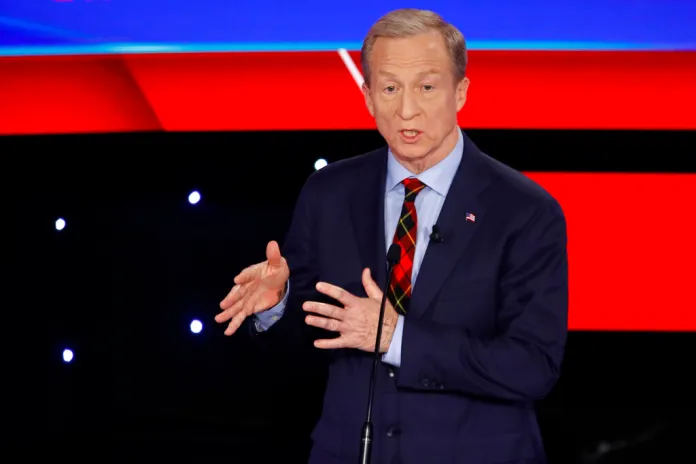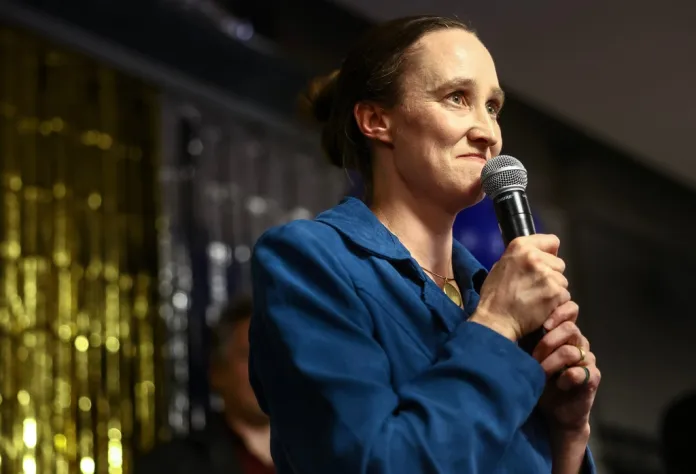Introducing Boston’s Democratic mayor challenging ‘woke’ policies.
Michelle Wu Takes a Stand Against Budget Cuts
Michelle Wu, the progressive mayor of Boston, is engaged in a fierce battle with her fellow Democratic city council members over the proposed 2024 operating budget. This budget includes significant cuts to the city’s police and veteran services departments.
As the city’s first-term mayor, Wu vetoed the budget on Friday, boldly challenging the “woke” policies that limit funding for law enforcement agencies and U.S. veterans. She is advocating for a “fiscally responsible” budget for the upcoming fiscal year.
“The scale and scope of amendments passed by the Council would result in reductions to the core City services that our residents depend on and deserve,” Wu expressed in a letter to the council members.
“Our budget must be responsive to the needs of our constituents, fiscally responsible, and built on a foundation of effective delivery of City services that are central to our residents’ quality of life,” she added.
The council’s proposal would have slashed $31 million from the city’s police force and $900,000 from the veteran services. However, it would have allocated an $8 million increase in funding for participatory budgeting, allowing city residents to have more say in how tax dollars are spent.
Wu had previously presented her own budget proposal in April, with a focus on making Boston more family-friendly. Her proposal included funds for schools, housing, libraries, senior centers, and public safety. However, the council’s version included $52 million in amendments to Wu’s proposal.
Michelle Wu: A Champion for Equity and Progress
Michelle Wu’s political journey began in 2013 when she became the first Asian American woman to sit on the council. In 2016, she made history again by becoming the first woman of color to lead the council as its president.
During her time as a councilor, Wu prioritized equity in healthcare and accessibility to city services through translators, interpretation, and assistive technology. Fluent in Mandarin and Spanish, she played a crucial role in passing Boston’s Paid Parental Leave ordinance and the Healthcare Equity ordinance, which banned discrimination based on gender identity.
In her mayoral campaign, Wu positioned herself as the more liberal candidate, advocating for the “dismantling of racism in policing” and the creation of a new public safety system. She called for alternatives to incarceration for nonviolent offenses, an end to the war on drugs, and increased investment in reentry services for those no longer in prison.
A Divisive Budget Battle
The current budget dispute has created a rift among Democrats in the liberal city of Boston.
Wu argued that the $31 million cut to the police force was “illusory” since the city was still obligated to cover salaries and overtime expenses. Councilor Tania Fernandes Anderson, chairwoman of the city’s Ways and Means Committee, countered that the department would have an additional $25 million in funds next year, based on her analysis.
Councilor Michael Flaherty strongly criticized the substantial decrease in law enforcement funding, warning that it would be “decimating” for the Boston Police Department. He praised the department’s community policing model and expressed concern about the consequences of defunding the police.
While the overall crime rate in Boston decreased by 1.5% in 2022 compared to the previous year, there was an increase in homicides. This rise in violence has added urgency to the debate over police funding.
Another contentious issue was the proposed cut to veteran services, which some councilors and city members viewed as a betrayal to the city’s veteran population. Council President Ed Flynn, who did not support the budget, received numerous calls from veterans across the country expressing their disappointment.
Despite voting in favor of the budget, Councilor Fernandes Anderson admitted regret over the proposed cut to veteran services.
The budget also included cuts to public works, transportation departments, and the Boston Public Library, which Wu argued would delay critical infrastructure projects in the city.
The $4.2 billion operating budget will now be returned to the city council, where the veto is not expected to be overturned. The budget was initially passed in a 7-5 vote, and eight council members would need to support the override to overturn the veto.
In response to the mayor’s veto, the city council has scheduled a special meeting for June 21 to address the rejection. However, the final budget vote will not take place until June 28.
Click here to read more from the Washington Examiner.
" Conservative News Daily does not always share or support the views and opinions expressed here; they are just those of the writer."




